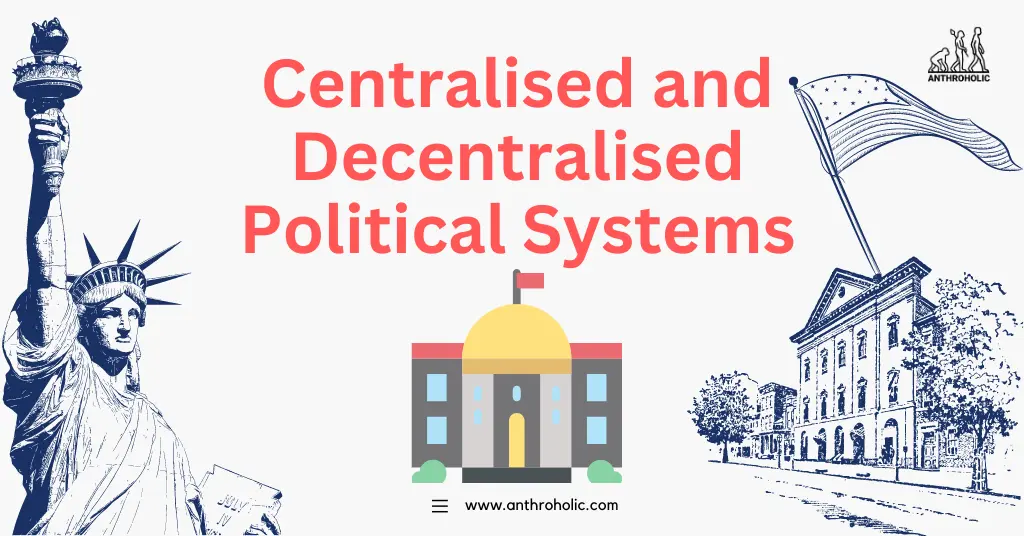AI Answer Evaluation Platform Live Now. Try Free Answer Evaluation Now
Centralised and Decentralised Political Systems
Political systems and governance structures are a fundamental aspect of any society, facilitating interactions and coordination among individuals and groups. Among these systems, Centralised and Decentralised political systems occupy opposing ends of a spectrum, each with its unique characteristics and implications for society.

Centralised Political Systems
Centralised political systems are characterised by the concentration of decision-making power and control at a single, central authority [1].
Features of Centralised Political Systems
Centralised systems exhibit certain common features [2]:
- High degree of power concentration at the top
- Top-down decision-making process
- Uniform policy implementation
- Reduced regional autonomy
The Roman Empire and the Soviet Union provide historical examples of centralised systems, while modern-day China exemplifies a largely centralised state.
Advantages and Disadvantages of Centralised Systems
Centralised systems offer benefits [3]:
- Efficiency in decision-making and policy implementation
- Nation-wide uniformity in policy
- Greater control over resources
However, they also have downsides [4]:
- Potential for authoritarian rule
- Lack of representation for regional interests
- Reduced local autonomy and innovation
Decentralised Political Systems
Contrasting centralised systems, decentralised systems distribute power and decision-making authority among numerous sub-national entities.
Features of Decentralised Political Systems
Key features of decentralised systems include:
- Power and decision-making distributed among regional or local entities
- Bottom-up decision-making process
- Regional variation in policy implementation
- High regional autonomy
The United States, with its federal system, and Switzerland, with its cantonal system, are typical examples of decentralised political systems.
Advantages and Disadvantages of Decentralised Systems
Decentralised systems offer unique advantages:
- Greater representation of diverse regional interests
- Encouragement of local innovation and solutions
- Reduced risk of authoritarian rule
But these systems also pose challenges:
- Potential for uneven policy implementation and resources distribution
- Slower decision-making and coordination
- Difficulties in managing national interests
Comparative Analysis of Centralised and Decentralised Systems
| Centralised Political System | Decentralised Political System | |
|---|---|---|
| Power | Centralised | Decentralised |
| Decision | Top-down | Bottom-up |
| Implementation | Uniform across nation | Varies regionally |
| Representation | More national focus | Diverse regional interests |
Conclusion
Centralised and decentralised political systems represent different approaches to governance and power distribution, each with its inherent benefits and challenges. Anthropology helps us understand these systems within their socio-cultural contexts, providing insights into their influence on society’s organisation and functioning. Neither system is inherently superior; rather, their effectiveness depends on various factors, including historical, cultural, and socio-economic contexts.
References
[1] Nnoli, O. (1986). Introduction to Politics. Enugu: Fourth Dimension Publishers.
[2] Agranoff, R. (2007). Federal evolution in Spain. International Political Science Review, 28(1), 9-25.
[3] Tsebelis, G. (2002). Veto Players: How Political Institutions Work. Princeton University Press.
[4] Cheema, G. S., & Rondinelli, D. A. (Eds.). (2007). Decentralising Governance: Emerging Concepts and Practices. Brookings Institution Press.




